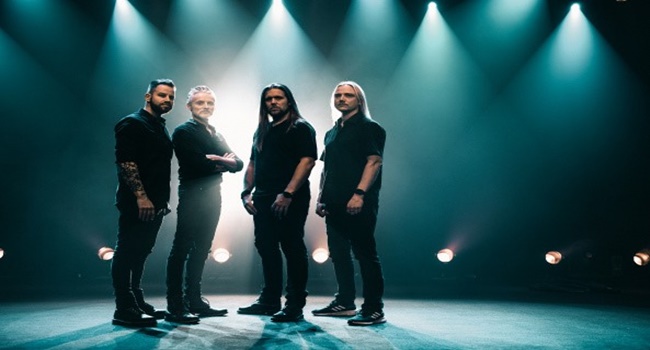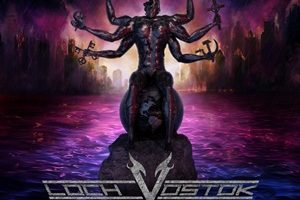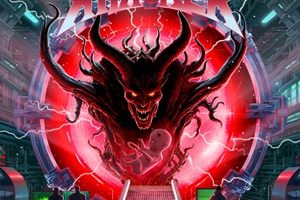Pyramaze – Object Permanence
Thursday, 22nd June 2023
A constant favorite even from the early years, Pyramaze are an international power/progressive metal act that pride themselves on delivering impactful material that is equally catchy as it is forward thinking in depth or approach. The newest album Bloodlines captures a tightly driven sound that is multi-dimensional, never sacrificing the necessary hooks, melodies, or circular runs needed to engage listener interest on first to latest exposure. Catching the man fighting off a cold, keyboardist Jonah Weingarten took the time to provide insight into the new record, special guest choices and how they color the record, discussion about lyrical content, interesting AI thoughts, what it was like to perform for the first time in almost four years, his consistent side hustle as an orchestration/keyboard session guy, plus what’s in the pipeline for activities going into 2024.
Dead Rhetoric: Bloodlines is the latest Pyramaze album – the seventh of the band’s career and follow-up to 2020’s Epitaph. Where do you see this set of material sitting in the catalog of albums for the group? Do you believe the extra downtime for the pandemic allowed you and Jacob as main songwriters to drill deeper into the details to achieve what you wanted even better than ever before?
Jonah Weingarten: I think that Bloodlines is a natural continuation of the Epitaph album. I feel like we’ve really hit our stride now with our sound in this newish lineup – even though this has been our lineup now for almost ten years now. We did take advantage of some downtime during the pandemic to write these songs. I’m already looking forward to writing new songs for the eighth album.
I think the songwriting between Jacob and I helps make our albums very diverse. All these songs are able to stand out individually as opposed to everything being this one amorphous blob. We have a really good creative process going on. When I write my songs, I do the keyboards and orchestration, send it over to them and they add guitars and drums. Whereas when Jacob writes songs, he does guitars and some scratch drum tracks, and sends them my way to do my thing. It’s been working very nicely.
Dead Rhetoric: Can you tell us about the special guest choices with Melissa Bonny, Andrew Kingsley, Olof Mörck, and Tim Hansen that appear in specific songs for Bloodlines? What are your thoughts on their talent and the additional coloring / flavors they add to make the tracks that much more special?
Weingarten: We lost our lead guitarist Toke last summer; he parted ways with us just because he didn’t want to be in the band anymore. He wanted to totally focus on other things in his life, which we understand. We obviously needed some guitar solos on the record. Having Andrew Kingsley from Unleash the Archers and Olof Mörck of Amaranthe and Tim Hansen do some guest solos was a really cool addition. And a necessary one. We wanted to ask some big names like that who were going to do a really great job, as we love all of those guitarists. And they certainly delivered. When it comes to Melissa Bonny, doing a duet on the song “Alliance” with our singer Terje, that song is very personal for me, so I was really happy when she agreed to be on the album and lend her amazing talent to the record. She’s touring with Kamelot right now as their guest female vocalist, and then she has her band Ad Infinitum and Dark Side of the Moon, which are all spectacular.
They are really helping bring these songs to life. They have their own individual styles as guitarists, and Melissa has a distinctive voice and style. It gives the album some nice coloring and flavoring.
Dead Rhetoric: You mention in the bio sheet that the lyrical content focuses on the curiosity of the unknown – hopefully stimulating your fans’ imagination without necessarily limiting their own interpretations of the subjects on hand. Do you believe the best lyrical content stirs debate and can be interpreted on numerous levels to personalize things for the listener – especially given the style of power/progressive metal you deliver?
Weingarten: Yes, I do. I think our lyrics have always been open to interpretation, more so recently on our newer material. We make a point of not forcing lyrical messages to our listeners, but instead letting them make it their own. And I’ve actually seen some interesting comments to some of our music videos who think that like we have some political agenda, or this, that and the other – and it’s really nothing like that at all. It reminds me of this one term in the psychological world: object permanence. Where people imagine things to be constant when they are not actually existing in their current reality. I notice that a lot with some of our fans regarding their interpretations of what our lyrics are about.
Dead Rhetoric: Do these interpretations differ with people who have English as their primary language versus other countries?
Weingarten: I can see that having an impact one way or the other. Although I think it’s based more on people’s personal experience in life. The song “Alliance” is a song that I wrote for my ex-fiancé, and it’s very personal to me, but I can see someone else taking those lyrics and making it more personal for them. At the end of the day, I hope it touches people personally and gives them something to grasp onto.
Dead Rhetoric: You also mention you will be releasing at least four singles for the album. Was this an easy process amongst the band to figure out which songs to premiere?
Weingarten: It wasn’t an easy process. Aside from the ballad, which was an obvious choice. All of the songs are really standout tracks and could be singles. We just tried to pick (songs) that were different from each other. “Broken Arrow” which was our first single was a bit more of a straightforward, modern song. “Fortress” the second single/music video, is more of a progressive, power metal-ish song, a bit more symphonic.
Dead Rhetoric: Remedy Art Design once again did a spectacular job on the cover art for the new record. How did the process work this time around – and where do you see the importance of cover art design these days to pull people into what they can expect when listening to the songs?
Weingarten: Remedy Art Design did our album cover again as they did for Epitaph. And this new one for Bloodlines, it’s my favorite album cover that we’ve ever had in the band. I really love the colors in it, it stands out. It doesn’t just say, ‘oh – I’m a metal album, I’m dark!’. I think it really ties in with our lyrical content and that it’s up for interpretation.
On the subject of album art, I’m really concerned for real artists. The AI world seems to be taking over, and it’s a cheap and easy way for bands to have cover art and things like that. I just don’t want AI to replace humanity, or in every aspect of art. It’s a dangerous thing. I hope the government is able to step in and do something to protect artists, because I feel like my job is next. What’s going to stop AI from composing orchestration for a Pyramaze song, or any other band?
Dead Rhetoric: I think that’s why the current writer’s strike in Hollywood is very important. I’ve seen the protests from the angle you just mentioned, where you have illustrators worried about AI taking over their jobs. It is a dangerous slope to figure out what humans can do versus AI…
Weingarten: It is almost Terminator-esque. The battle of man versus machine has begun. This is the first battlefield, this creativity, art and human expression. I’ve seen that ChatGPT write lyrics to a Pyramaze song, and I couldn’t believe this is happening. My friend showed me, what is Pyramaze, and what are their lyrics about? And then he was like, ‘write a Pyramaze song’, and the lyrics were actually good. He told the program to make the lyrics darker, and it did that. It’s just terrifying, I couldn’t even believe it.
Dead Rhetoric: Recently you played the Copenhagen Nordic Noise Festival – how do you think the performance went, and what was it like getting out there to play a show after some years on the sidelines due to the pandemic? Do you think there is a newfound appreciation for live entertainment that may have been taken for granted previously?
Weingarten: There is definitely a newfound appreciation for live shows. This was our first live performance in three and a half years – it had been so long that I was even questioning myself, do I still have it? Am I too old for this? It was our first time playing songs from the Epitaph album too live, because that was our pandemic album that came out in 2020. It was great to play new songs from the Bloodlines album, and the Epitaph album. Our music is so big and powerful, it is made for the stage.
I got to catch Evergrey the next night at the festival. They are so good live; I’ve been a fan of that band since I was in high school. They just keep getting better and better after all these years. So that was cool. I notice Tom the vocalist, he is just as awesome live as he is on the records.
Dead Rhetoric: Did the pandemic help or hurt your side hustle work ethic when it comes to being a musician? How did you handle things from a mental health perspective to stay motivated when everyone was essentially stuck in home, lockdown mode for so long?
Weingarten: 2020 was my most productive year as a session musician, because other bands had so much downtime, so they spent that time being creative. I worked on so many albums that year, it was nice. It was pretty profitable.
Dead Rhetoric: Your vocalist Terje Harøy was a part of the Norwegian version of The Voice competition show earlier this year. Has he talked to you or the band about this experience – and do you believe it aids the profile of Pyramaze to a new audience who may not be otherwise aware of his talents?
Weingarten: I think we may have gotten a little bit more attention from it. The show producers edited out any time that he mentioned he was in Pyramaze. For whatever reason. That’s unfortunate. I watched all his performances on the show, and he really knocked it out of the park for sure.
Dead Rhetoric: Catalyst Crime is your other symphonic metal-oriented international band who released a self-titled album in 2021. What was the response like for this record – and are there plans in the works for a follow-up effort down the line?
Weingarten: Yeah, we got a good response to our debut album. We are in the process of working on our second album now, and the drum tracking starts in three weeks. Stylistically, I am taking more of a hand in the songwriting this time. It’s going to be even more symphonic; we are focusing on having a more polished production this time too.
Dead Rhetoric: What would you say are some of the biggest challenges currently facing Pyramaze to establish an even stronger footprint in the global scene, and maybe move up the ladder in terms of popularity/ audience share?
Weingarten: We don’t play live as often as we would like to. Just because of the way our lives are set up. There’s that, but I think because of music videos and the internet there are different ways of promoting bands these days. We are still able to grow, and we are able to expand our audience by having really cool guest appearances.
Dead Rhetoric: What’s on the agenda for anything related to Pyramaze or Jonah Weingarten related musical activities over the next twelve months or so?
Weingarten: I’m going to start writing new songs for Pyramaze this summer, during my free time. Besides that, I’ve been working with a lot of big bands from all around the world, playing on their albums. I’m going to keep doing that, so you’ll see my name on a lot of new releases. I have at least ten coming out this year, it’s crazy. I have a streamlined and successful session work business; I enjoy doing this. There is a festival in Norway we may do in 2024, and we will see if other opportunities come our way.




























